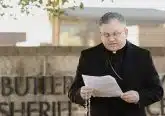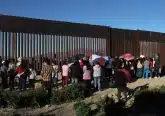Archbishop Dennis M. Schnurr’s Statement on sexual abuse crisis
On Tuesday of this week, a Pennsylvania Grand Jury released a report detailing the names of 301 priests who sexually abused over 1,000 minors over a 70-year period in that state. This report, coupled with the recent revelations regarding the former Cardinal Theodore McCarrick, shocks, saddens, and angers Catholics everywhere, including myself. The depth of depravity and evil described in these reports is stunning. No words can diminish the level of revulsion one feels at reading them.
From the depths of my heart, I am sorry for the terrible pain and suffering experienced by the victims of abuse throughout their lives. I am sorry for the deep shame that Catholic lay people rightfully feel at the inexcusable behavior of certain cardinals, bishops, and priests, the emotional exhaustion of having to defend their faith to friends and co-workers, and the discouragement of having to relive a deep tragedy that we all hoped was behind us. I am sorry for the stigma that good and holy priests who are committed to their vocation and vows have to endure wherever they go. I am sorry for the trust that has collectively been violated.
The Archdiocese of Cincinnati is unequivocally committed to the protection of all people, children and adults, involved with any of our various ministries. At this time, there are no active cases of clerical abuse of minors anywhere in the Archdiocese of Cincinnati. If you suspect abuse on the part of any agent of the Archdiocese, please report it to the appropriate civil authorities, as well as to the Coordinator of Ministry to Survivors of Abuse in the Archdiocese at 513-263-6623 or 1-800-686-2724, ext. 6623. If you see something, please say something.
Since 1993, the Archdiocese has embraced and promulgated the Decree on Child Protection, which now also covers vulnerable adults, including:
• Complete background checks on all clerics, employees and volunteers;
• Ongoing required training for clerics, employees, and volunteers on recognizing the signs of abuse of children and vulnerable adults;
• Procedures for reporting suspected abuse;
• Immediately reporting all allegations of abuse to the appropriate civil authorities;
• A Child Protection Review Board that is comprised primarily of lay people;
• Training of children in Catholic schools and religious education programs on warning signs and appropriate responses for their own protection; and
• Onsite independent audit of policies and procedures by an outside firm.
The Archdiocese of Cincinnati is committed to transparency. To that end, for the past 15 years, we have published the names and status of all priests credibly accused of abuse on the archdiocesan website. This can be found at http://www.catholiccincinnati.org/protecting-children/resources-and-publications/status-report-on-clerics-accused-of-child-abuse/.
The Archdiocese is also committed to ensuring that the men who will be ordained to the priesthood are indeed suitable for ministry in the Church and worthy of the trust of the Catholic faithful. Every applicant to the seminary undergoes a full battery of psychological testing prior to acceptance into the seminary program. Once accepted, the candidate has, at a minimum, four years of formation in which he is taught what he needs to know in order to be a priest. During this time, his disposition, behavior, self-awareness, and stability and goodness of character are also evaluated. When a man discerns that God might be calling him to the priesthood, the Church has a duty to discern that call as well, to make sure he is truly called and of the right character to serve faithfully and well.
Many of you may be feeling that Jesus has forsaken the Church. This is not true. Rather, some members of the Church have forsaken Jesus and the call to be disciples. Jesus established His Church on earth and promised to never leave us. As we know from the Gospel of John, “the light shines in the darkness, and the darkness has not overcome it” (Jn 1:5).
Today, Cardinal Daniel N. DiNardo, president of the United States Conference of Catholic Bishops, announced the foundation of a plan (included below) to comprehensively address the issue of abuse and the failure in leadership among our bishops. This plan will include the active involvement of both the laity and the Holy See. I pledge my personal dedication to this effort and to keeping you informed of its progress.
Please join me in praying for the healing of all victims of the grave sin of sexual abuse. May the Blessed Virgin Mary, patroness of the Catholic Church in the United States, continue to intercede for us. May the Holy Spirit continue to guide and protect us.
Most Reverend Dennis M. Schnurr
Archbishop of Cincinnati
President of U.S. Bishops’ Conference Announces Effort That Will Involve Laity, Experts, and the Vatican stating, “Let me ask you to hold us to all of these resolutions,” as U.S. Bishops’ Offer Firm Resolve to Address “Moral Catastrophe”
August 16, 2018
WASHINGTON— Cardinal Daniel N. DiNardo of Galveston-Houston, President of the United States Conference of Catholic Bishops (USCCB), has issued the following statement after a series of meetings with members of the USCCB’s Executive Committee and other bishops. The following statement includes three goals and three principles, along with initial steps of a plan that will involve laity, experts, and the Vatican. A more developed plan will be presented to the full body of bishops at their general assembly meeting in Baltimore in November.
Cardinal DiNardo’s full statement follows:
“Brothers and Sisters in Christ,
Two weeks ago, I shared with you my sadness, anger, and shame over the recent revelations concerning Archbishop Theodore McCarrick. Those sentiments continue and are deepened in light of the Pennsylvania Grand Jury report. We are faced with a spiritual crisis that requires not only spiritual conversion, but practical changes to avoid repeating the sins and failures of the past that are so evident in the recent report. Earlier this week, the USCCB Executive Committee met again and established an outline of these necessary changes.
The Executive Committee has established three goals: (1) an investigation into the questions surrounding Archbishop McCarrick; (2) an opening of new and confidential channels for reporting complaints against bishops; and (3) advocacy for more effective resolution of future complaints. These goals will be pursued according to three criteria: proper independence, sufficient authority, and substantial leadership by laity.
We have already begun to develop a concrete plan for accomplishing these goals, relying upon consultation with experts, laity, and clergy, as well as the Vatican. We will present this plan to the full body of bishops in our November meeting. In addition, I will travel to Rome to present these goals and criteria to the Holy See, and to urge further concrete steps based on them.
The overarching goal in all of this is stronger protections against predators in the Church and anyone who would conceal them, protections that will hold bishops to the highest standards of transparency and accountability.
Allow me to briefly elaborate on the goals and criteria that we have identified.
The first goal is a full investigation of questions surrounding Archbishop McCarrick. These answers are necessary to prevent a recurrence, and so help to protect minors, seminarians, and others who are vulnerable in the future. We will therefore invite the Vatican to conduct an Apostolic Visitation to address these questions, in concert with a group of predominantly lay people identified for their expertise by members of the National Review Board and empowered to act.
The second goal is to make reporting of abuse and misconduct by bishops easier. Our 2002 “Statement of Episcopal Commitment” does not make clear what avenue victims themselves should follow in reporting abuse or other sexual misconduct by bishops. We need to update this document. We also need to develop and widely promote reliable third-party reporting mechanisms. Such tools already exist in many dioceses and in the public sector and we are already examining specific options.
The third goal is to advocate for better procedures to resolve complaints against bishops. For example, the canonical procedures that follow a complaint will be studied with an eye toward concrete proposals to make them more prompt, fair, and transparent and to specify what constraints may be imposed on bishops at each stage of that process.
We will pursue these goals according to three criteria.
The first criterion is genuine independence. Any mechanism for addressing any complaint against a bishop must be free from bias or undue influence by a bishop. Our structures must preclude bishops from deterring complaints against them, from hampering their investigation, or from skewing their resolution.
The second criterion relates to authority in the Church. Because only the Pope has authority to discipline or remove bishops, we will assure that our measures will both respect that authority and protect the vulnerable from the abuse of ecclesial power.
Our third criterion is substantial involvement of the laity. Lay people bring expertise in areas of investigation, law enforcement, psychology, and other relevant disciplines, and their presence reinforces our commitment to the first criterion of independence.
Finally, I apologize and humbly ask your forgiveness for what my brother bishops and I have done and failed to do. Whatever the details may turn out to be regarding Archbishop McCarrick or the many abuses in Pennsylvania (or anywhere else), we already know that one root cause is the failure of episcopal leadership. The result was that scores of beloved children of God were abandoned to face an abuse of power alone. This is a moral catastrophe. It is also part of this catastrophe that so many faithful priests who are pursuing holiness and serving with integrity are tainted by this failure.
We firmly resolve, with the help of God’s grace, never to repeat it. I have no illusions about the degree to which trust in the bishops has been damaged by these past sins and failures. It will take work to rebuild that trust. What I have outlined here is only the beginning; other steps will follow. I will keep you informed of our progress toward these goals.
Let me ask you to hold us to all of these resolutions. Let me also ask you to pray for us, that we will take this time to reflect, repent, and recommit ourselves to holiness of life and to conform our lives even more to Christ, the Good Shepherd.”













